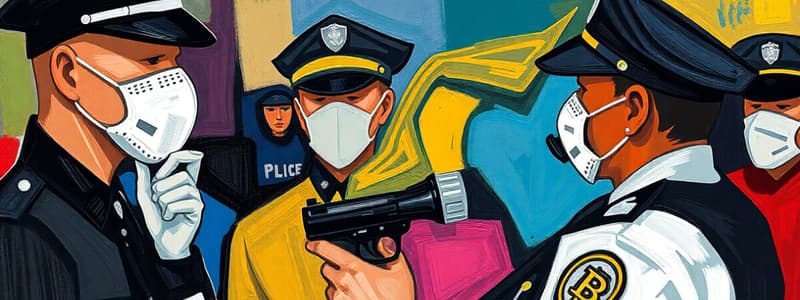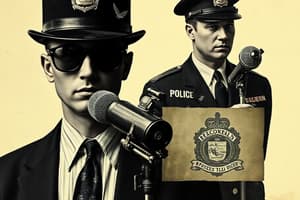Podcast
Questions and Answers
According to the policy, when can a Deputy lawfully prevent someone from recording them?
According to the policy, when can a Deputy lawfully prevent someone from recording them?
- When the person being recorded is wearing a disguise.
- When the person being recorded is obstructing the Deputy's duties. (correct)
- When the person being recorded is using a camera with a telephoto lens.
- When the person being recorded is too close to the Deputy.
Which of the following is NOT considered a public place according to the policy?
Which of the following is NOT considered a public place according to the policy?
- A bus station
- A school hallway
- A private residence (correct)
- A hospital waiting room
What is the primary purpose of this policy?
What is the primary purpose of this policy?
- To restrict the public's right to record law enforcement officers.
- To encourage the public to record law enforcement officers in public places.
- To provide deputies with clear guidance on handling situations where they are being recorded. (correct)
- To protect the privacy of law enforcement officers while on duty.
According to the policy, why should deputies assume they are being recorded at all times when on duty in a public space?
According to the policy, why should deputies assume they are being recorded at all times when on duty in a public space?
What does the policy say about a person's distance from a deputy engaged in police duties?
What does the policy say about a person's distance from a deputy engaged in police duties?
Flashcards
What is a 'Public Place'?
What is a 'Public Place'?
Places where members of the public have access, including streets, highways, schools, hospitals, and shops.
What is 'Recording'?
What is 'Recording'?
Capturing images, audio, or both using a camera, cell phone, or audio recorder.
What is 'Media'?
What is 'Media'?
The storage source for visual or audio recordings, like film, analog tape, or digital files.
What is the Right to Record?
What is the Right to Record?
Signup and view all the flashcards
How can recording activities be limited?
How can recording activities be limited?
Signup and view all the flashcards
Study Notes
Bexar County Sheriff's Office Policy Manual - Recording of Official Police Acts
- Effective Date: April 1, 2019
- Chapter Number: Forty-Six
- Policy Subject: Recording of Official Police Acts
- References: Sheriff's Manual Chapter 19, Texas Penal Code - § 1.07
- Distribution: All Sheriff's Employees
- Supersedes: Previous policy
- Review Date: 04/01/2021
- Number of Pages: 3
Policy 46.01
- Public Recording Rights: Members of the public (including media) have an unambiguous First Amendment right to record Deputies and other government officials in public places (e.g., buildings, transportation).
- Exceptions: Exceptions include violations of Texas Penal Code Section 38.15 (Interference with Public Duties) or if the recording creates a safety risk for the Deputy or others.
- Implied Recording: Deputies should assume they are being recorded at all times in public.
Policy 46.02
- Purpose: To guide Deputies on how to handle situations where they are being recorded. This includes any form of media recording: photographing, videotaping, audiotaping, etc.
Policy 46.03
- Definitions:
- Media: Any storage source (film, analog, digital) for visual or audio recordings.
- Public Place: Locations accessible to the public, includes but not limited to streets, highways, common areas in schools, hospitals, apartment houses, office buildings, transport facilities, shops.
- Recording: The capturing of images, audio, or both using cameras, cell phones, audio recorders, or other devices.
Policy 46.04 Procedures
- Distance from Deputies: Maintain a reasonable distance from deputies engaged in enforcement or related police duties.
- Obstruction: Individuals may not obstruct police activities or interfere through direct physical intervention, tampering with witnesses, or repeatedly questioning deputies.
- Arrest:
- Inform individuals of prohibited activity and acceptable alternatives before arrest.
- Arrest should be related to a separate, objective, lawful violation, not the act of recording.
- Recording itself is not grounds for arrest.
- Arrest does not justify a search for recording devices.
- Seizure of Recording Devices:
- Devices cannot be seized absent arrest.
- Deputies should not order individuals to show recordings of enforcement.
- Seizure is allowed if probable cause to believe evidence of a serious crime is recorded, and a supervisor is consulted.
- Voluntary consent is preferable.
- Devices must be held for the shortest duration necessary to obtain a warrant
- Exigent Circumstances: Devices may be seized if immediate viewing is required to prevent serious harm.
Policy D - Supervisory Responsibilities
- Supervisor is required to respond to any incident where an individual is recording a deputy's activity and being potentially arrested; or when recording equipment may be seized without a warrant or lawful consent.
Studying That Suits You
Use AI to generate personalized quizzes and flashcards to suit your learning preferences.
Related Documents
Description
This quiz tests your knowledge of Chapter Forty-Six of the Bexar County Sheriff's Office Policy Manual, which focuses on the recording of official police acts. Understand the rights of the public to record law enforcement and the guidelines for deputies regarding public recordings. Stay informed about the implications of these policies in practice.





